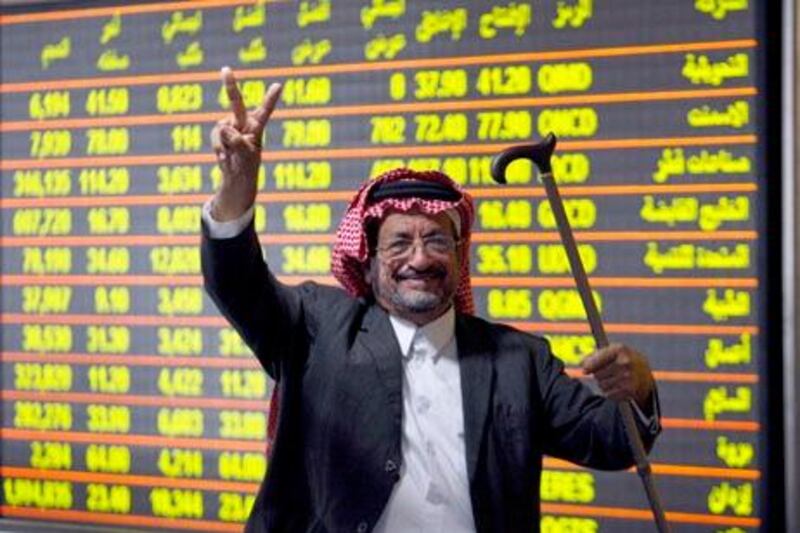Recent regional unrest and the worst financial crisis in a generation have failed to dampen Gulf investors' expectations of huge returns over short periods of time, according to a new survey by NMG Group, a consultancy.
More Business news: Editor's pick of today's headlines
Last Updated: May 23, 2011
UAE consumers among world's most optimistic Consumer confidence soars in the Middle East, which researchers attribute to a feel-good factor following the easing of the region's political unrest. Read article
Chinese security company leaves Nasdaq Dubai A Chinese security firm is removing its shares from trading on the Nasdaq Dubai, bringing the number of stocks listed there to 10. Read article
Saudi offers assistance to Egypt Egypt receives an offer of $4bn in aid from Saudi Arabia to help stabilise its economy. Read article
Corporate fraudsters in the Gulf being caught in greater numbers Instances of corporate fraud are plentiful in the Gulf, according to a new survey from Deloitte Corporate Finance. Read article
[ More Business ]
Local GCC investors expect to get 11 per cent returns annually and typically hold on to investments for just 2.2 years, according to the survey of more than 100 institutional and retail investors. Indian expatriates living in the GCC also expected to make 11 per cent a year, but they intended to hang on for longer - 5.7 years, on average.
That contrasted starkly with the views of western expatriates, who were expecting just 7 per cent returns over an average holding period of 6.7 years. Historically, developed-world stock market returns have averaged between 7 and 8 per cent per year.
The results underscore that asset managers have yet to convince local investors of the merits of long-term investing, according to Nick Tolchard, the head of Invesco Middle East, the investment firm that commissioned the survey. The survey also showed that the region's growing asset management industry has not yet attracted locals who prefer to invest on their own and put their money primarily in tangible assets such as property, he said.
About 83 per cent of the people polled by NMG said GCC investors had short time horizons, largely because of a lack of experience and cultural preferences. Sovereign wealth funds in the GCC were looking furthest ahead, the survey found, with an average 6.7 year time horizon, while expatriates came in second at 5.1 years and GCC nationals followed at 2.2 years.
"The only other market where we see that sort of short-term-ism would be Hong Kong," Mr Tolchard said.
Akram Annous, a fund manager at Al Mal Capital in Dubai, said expectations of high returns in short time frames was an overhang from earlier bubbles in local stock and property markets. Local investors, he said, had grown accustomed to doubling and tripling their money, making it hard to convince them to invest in safer but less profitable ways.
"The horizons are shorter because of the fact that markets were born so quickly and went into a frenzy so fast," he said. "You have a lot of people who are used to the punting mentality."
Nearly 90 per cent of those surveyed said they thought GCC investors had high exposure to tangible assets, largely due to cultural preferences. Local GCC investors had a 14.8 per cent average exposure to property, the survey found, compared to 9.5 per cent for expatriates.
"GCC investors clearly prefer assets that are clear, understandable and easy to access," Mr Tolchard said.
The findings also revealed wide differences between countries within the GCC, with Qataris expecting average returns of 21 per cent and Emiratis and Saudis looking for gains of around 10 per cent. Qatar's economy is the fastest-growing in the world, with the IMF projecting a 20 per cent rise in activity there this year. It is also the world's wealthiest country on a per-capita basis.





